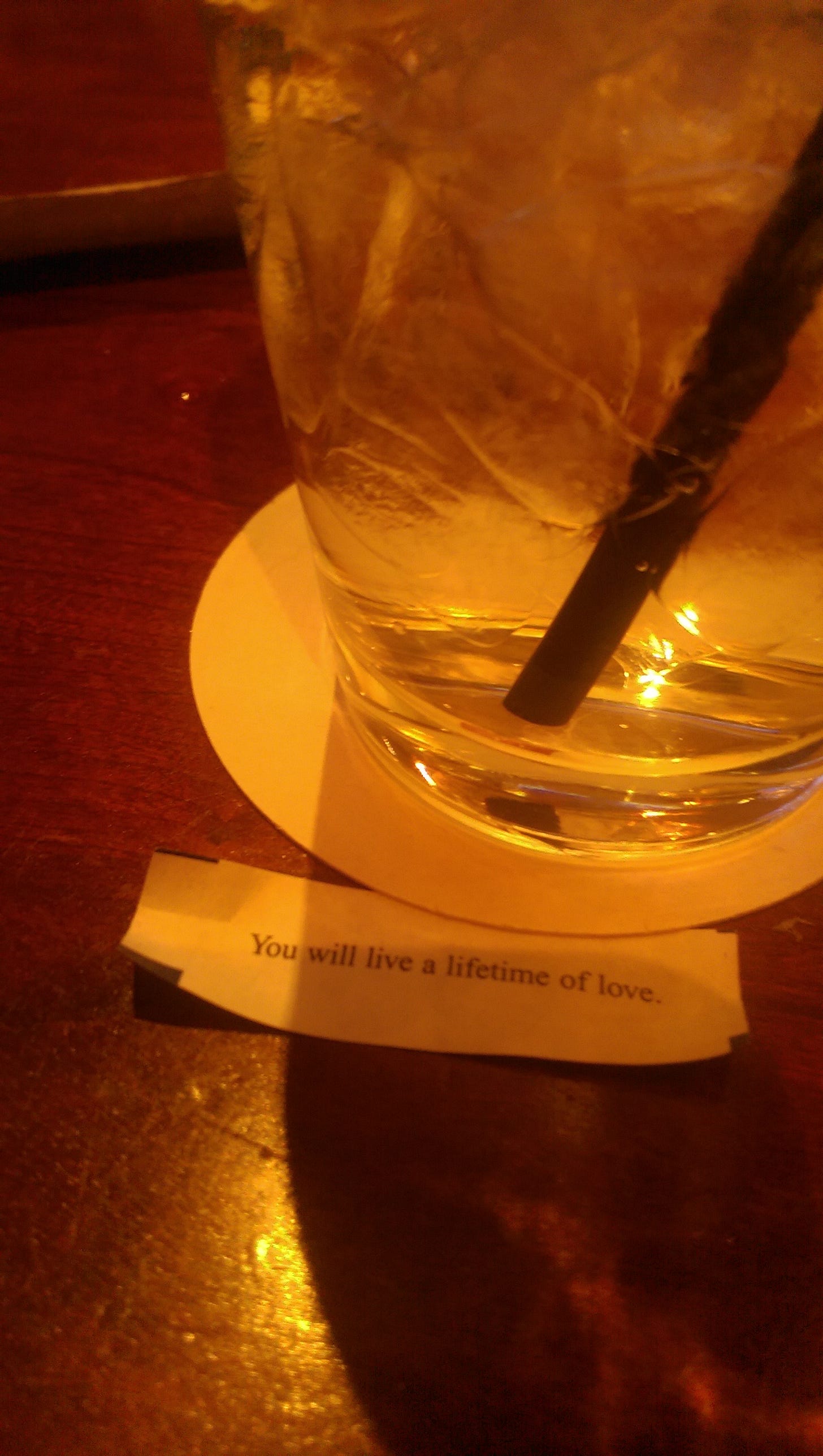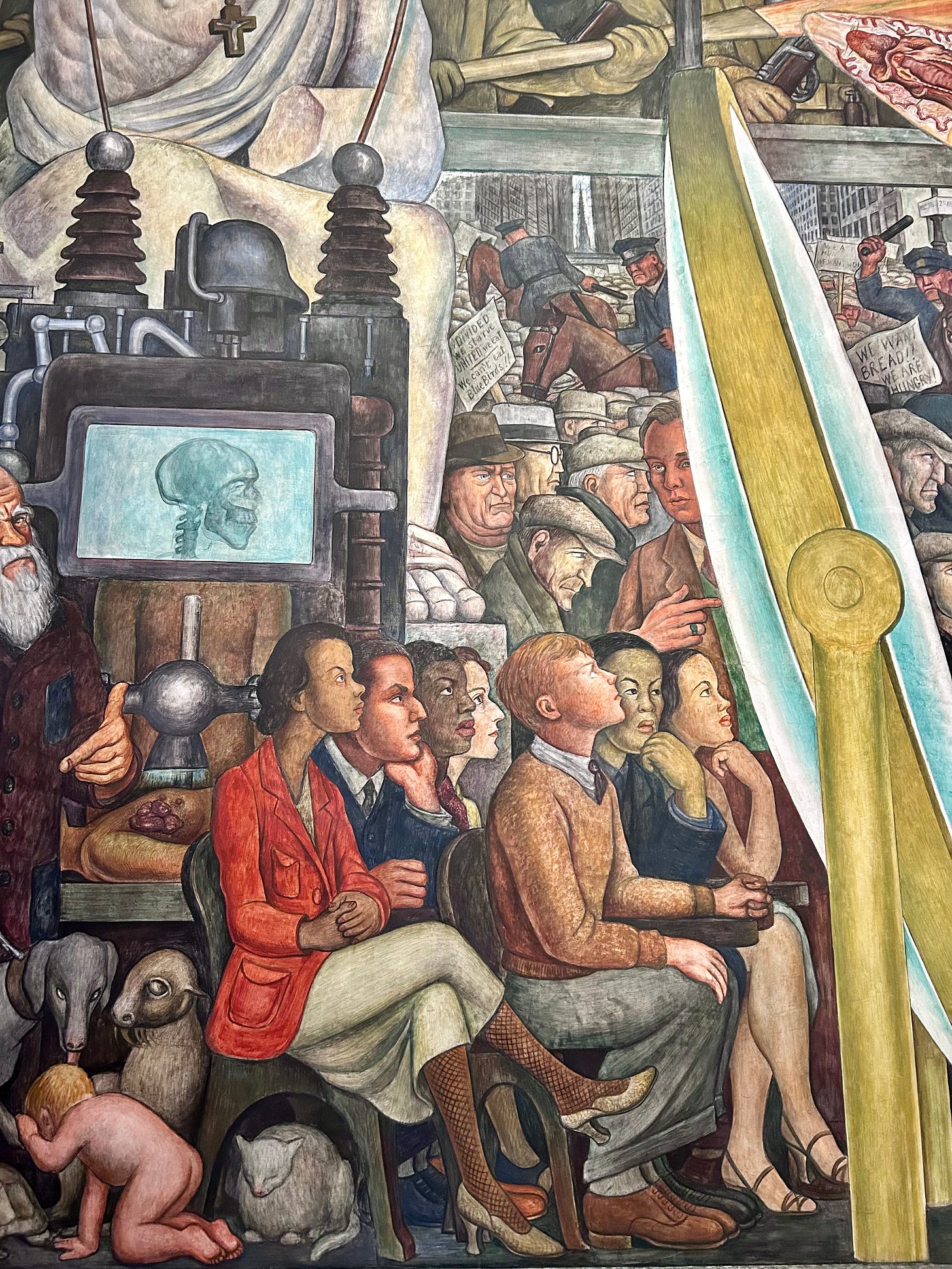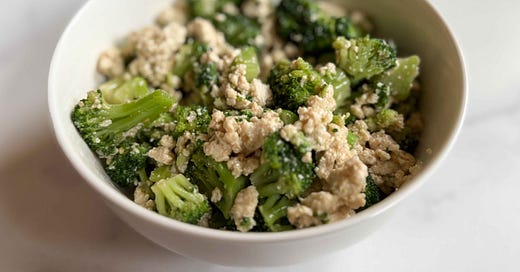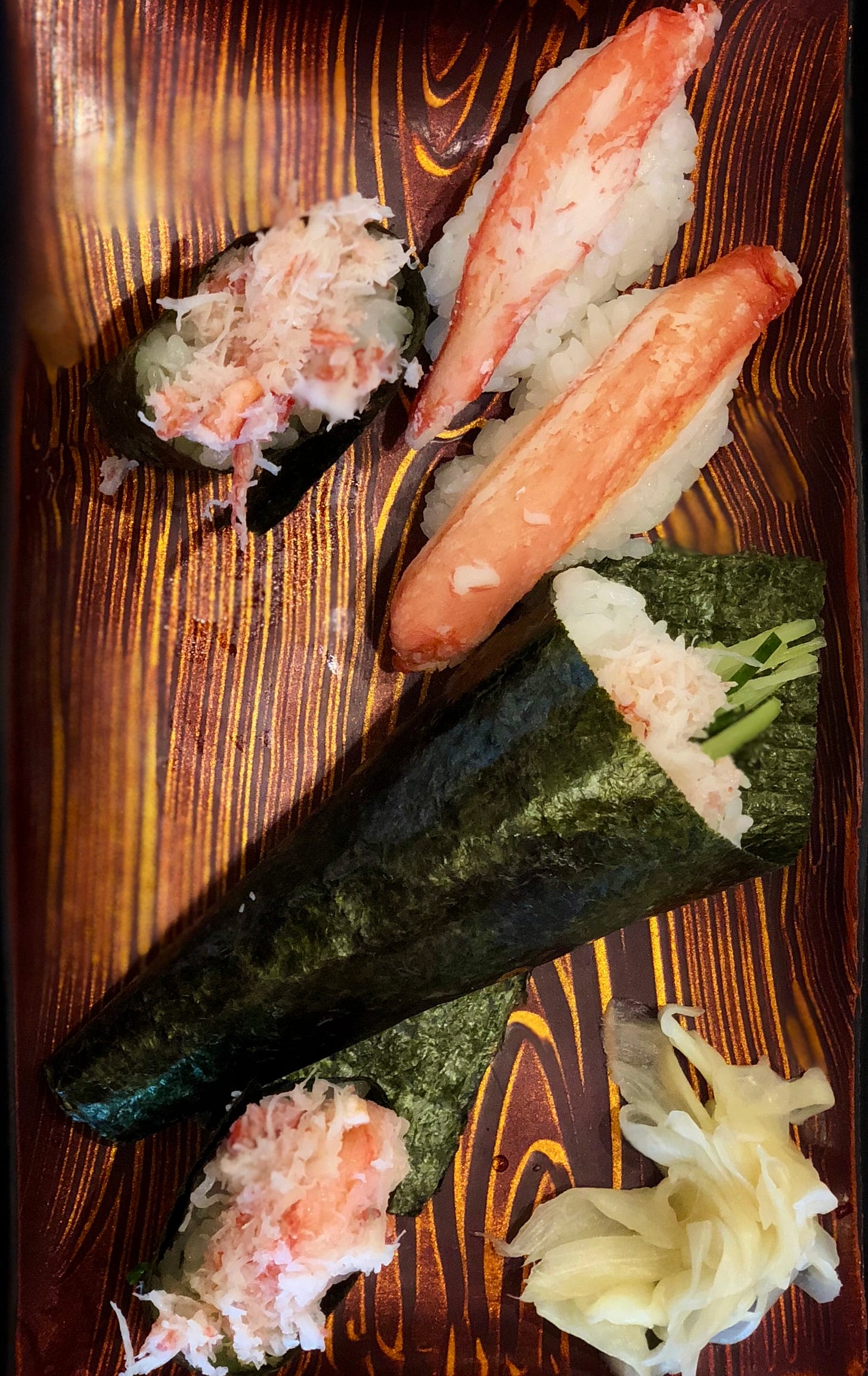Oh, glorious solo dinner
Why (and how) eating alone can be a pleasure. With a bonus guest post from one of my favorite essayists.
The late French philosopher Jean Baudrillard famously wrote, “Sadder than destitution, sadder than a beggar is the man who eats alone in public. Nothing more contradicts the laws of man or beast, for animals always do each other the honor of sharing or disputing each other's food.”
I beg to differ. As much as I love dining with husband, friends and family, to me there’s something incredibly liberating about dining solo. It’s a luxurious chance to eat exactly what I want, the way I want it.
Often it’s a big bowl of something: a snazzy salad, some soup, or maybe my childhood favorite comfort food, noods ’n’ codg. (That’s pasta, usually egg-noodles but sometimes elbow mac, cooked then tossed with cottage cheese. Weirdly good.)
Sometimes it’s something I’m craving. An artichoke. Or a chicken tostada. Or a giant plate of garlicky sautéed rapini with a jammy-yolk boiled egg broken on top.
Usually my solitary treat comes from my kitchen, but tonight I might pick up some nam khao because I’m craving the umami-meets-tang freshness of Lao rice salad wrapped in lettuce leaves.
Before I left for France in late May, I put together a dish from Umma: A Korean Mom’s Kitchen Wisdom — Broccoli Dubu Muchim. The book is this month’s CWB Cookbook Club selection, and I’d already test-driven the recipe. It’s a terrific solo dinner dish because it’s based on frozen broccoli florets (I know; that doesn’t sound like me) and firm tofu, both of which you can always keep stocked. The dish also delivers serious umami, from fish sauce. A double-portion was a perfect dinner for one.
And when I returned from France (Thierry’s still there), I had friends over for dinner — caprese salad, leg of lamb with Tangy Green Everything Sauce, couscous salad, sautéed rapini — and then ate the leftovers for a week, lunch and dinner. I adore leftovers; Thierry tolerates them. Eating alone gave me the freedom to revel in them.
The guest post
My friend
also loves solo dining. I’m excited to share with you a wonderful essay on the subject from her travel-focused Substack, Dispatches From The Road.You may remember Dispatches, as it was one of my Featured Five Substacks in April. Now Dispatches From The Road lives on my recommended Stackroll.
A terrific essayist whose work has little-to-nothing to do with conventional, reader-service-y travel writing, Diana writes about “the weird, messy, mystical, human side of travel” — including, sometimes, the food part. I love the way her essays take us through the movement of her mind, and her sentences are beautiful. In fact, she’s about to head to Barcelona to teach a writing workshop she’s calling “How to Write a Sentence.”
I hope you enjoy her work as much as I do. If you love this piece, do subscribe to Dispatches — it always delights.
❦ ❦ ❦
Guest post from Diana Spechler
TABLE FOR ONE
Recently, a woman told me that she feels judged when she eats alone in a restaurant. She said that she hears disdain in the hostess’s greeting: “Just you?” She said that even when the place is dead, she’s denied a booth. She said that the servers dismiss her and the other diners pity her.
This sounds crushing. And utterly foreign.
I frequently travel alone. I frequently eat in restaurants alone, preferably at the bar. I usually seek out sushi, even if I’m in, like, Nebraska. I love sushi. I love to eat sushi by myself at the sushi bar in Nebraska. (Actually, I don’t think I’ve been to Nebraska.)

There are three things I can’t consume responsibly: pistachios, chips and salsa, and sake. I have learned never to buy pistachios. Because I live in Texas, I’m frequently held hostage before complementary chips and salsa, watching my hand overthrow the regime of my free will. I try to make sake a special treat, but what is sushi without a nice, crisp sake? I love to eat sushi and drink sake, alone with my thoughts, preferably far from home, and then sleep in a hotel room.
When I was a child, the grownups called unmarried men “permanent bachelors.” I’ve never heard anyone in my generation say “permanent bachelor.” I’m proud of us for that. “Permanent bachelor” wasn’t as insulting as “old maid,” but it wasn’t generous, either. A permanent bachelor was “stuck in his ways.” To be stuck in one’s ways was egregious. I pictured the permanent bachelor, stuck in his ways, reading a newspaper on the toilet while struggling to shit.
Today, my sense of those permanent bachelors is that after many adult years un-partnered, they had the space and time and freedom to determine, This is how I like to live. Perhaps they didn’t care what others thought of their “ways.” Or they did care, because no human can resist the Siren song of caring, but they preferred to be stuck where they were (I mean, not on the toilet) than where others believed they should be.
It’s hard to be alone and it’s hard to be with people, but both are easy, too. You get the hang of things either way. Sometimes you feel incomplete and sometimes you observe an alternative and think, Thank god that’s not my life. If you have a bent toward envy, you’ll wish yourself into others’ existences. If you’re more curious than covetous, you’ll just as effortlessly emerge from the reverie, like turning the novel face-down on the table. (I never understood the precious insistence on bookmarks.)

Only one experience, ever, made me rethink eating alone.
I swear I sometimes eat food that’s not Asian, but this experience transpired in a Chinese restaurant while I was on assignment in Houston: The guy at the table next to mine began to choke.
Previously, I had only known human faces to exist in certain colors, but the diner inches away from me had a purple-blue face from an alien palette.
Years before I was born, while running on a beach, my dad gave life-saving mouth-to-mouth to a man who washed up on shore. I’ve thought about that scene a lot. I can picture it as though I was there, and every time, I tell myself: I need to learn CPR. That day in Houston, I had not learned CPR. (Today, I have also not learned CPR.)
The crowd in the Chinese restaurant, in the middle of the lunch rush, fell silent. That was eerie because it was inexplicable. The restaurant was big. And it was full. But some invisible judge banged his gavel, alerting us that we had no choice: It was time for a reminder of our mortality. All eyes turned to the choking man, who was waving his hands in helpless circles.
The servers rushed over, one with a pointless glass of water, and stood uselessly beside a man enduring the worst, possibly last, moments of his life.
*
Being alone may be less stigmatized today, but pearl-clutching persists. I cringe every time someone says “cat lady,” at every mention of the “loneliness epidemic,” at every lamentation of the divorce rate, at every insistence that Americans are “lonely” because American individualism is inherently selfish. These ginned-up crises are reflections of the fears, or the envy, or the religious delusions of those who ginned them up.
Listen.
You are ok.
Just pick up your chopsticks. Just touch a tiny corner of your sashimi to your soy sauce. Just sip—slowly, responsibly, like a goddamn lady—your cold, dry sake. Chat with the bartender or the sushi chef or the couple to your right. That couple wants to tell you things they wouldn’t tell those who know them. Ask them what the coolest thing is to do in Nebraska. Ask them why they chose bar over table. Ask them how they met. Ask them which of their children is their favorite.
That day in Houston, though, I wasn’t at the bar. There was no bar. I was alone at a table with a front-row seat to a horror show. I don’t know how long the choking went on because time stretched out the way it does during a car accident, but eventually the man’s dining partner stood calmly. He positioned himself behind his choking friend, arms around torso. One quick thrust and that assassin of a food ball went flying across the table.
Throughout the restaurant, there was a collective release of breath because, as it turned out, no one could breathe until everyone could breathe. And then people called for their checks, waiters tightened their aprons around their hips, the noise level rose like color returning to a face. I called for my check, too, leaving most of my food untouched.
In terms of fight-flight-freeze, I am a freezer. I am not “good in an emergency.” I am stuck. Watching the man choke, it was as if someone had stopped time, the way Evie did on that show Out of This World. I froze mid-action, perhaps glass to mouth, or dumpling to mouth, inches from a man who, it seemed, was going to die with 100 witnesses.
Afterward, outside, the world looked sharp and crisp, as if the magic mushrooms were kicking in. I felt terrifyingly aware that I was alive, that I wouldn’t be forever. And that among 100 people, the only one to tend to the dying man was the only one eating at his table.
❦
Happy summer — have a great weekend!
Love, Leslie
[Books purchased through the Bookshop link above may earn me an affiliate commission. Thank you for using it to make your purchase - it helps support this endeavor!]







Love this post and love treating myself to dinner for one. In his book on hospitality “Setting the Table,” restaurateur Danny Meyer discusses his decision to treat solo diners at Union Square Cafe “as royalty,” because it “was both the right thing to do and smart business.” And thanks for sharing Diana’s excellent essay.